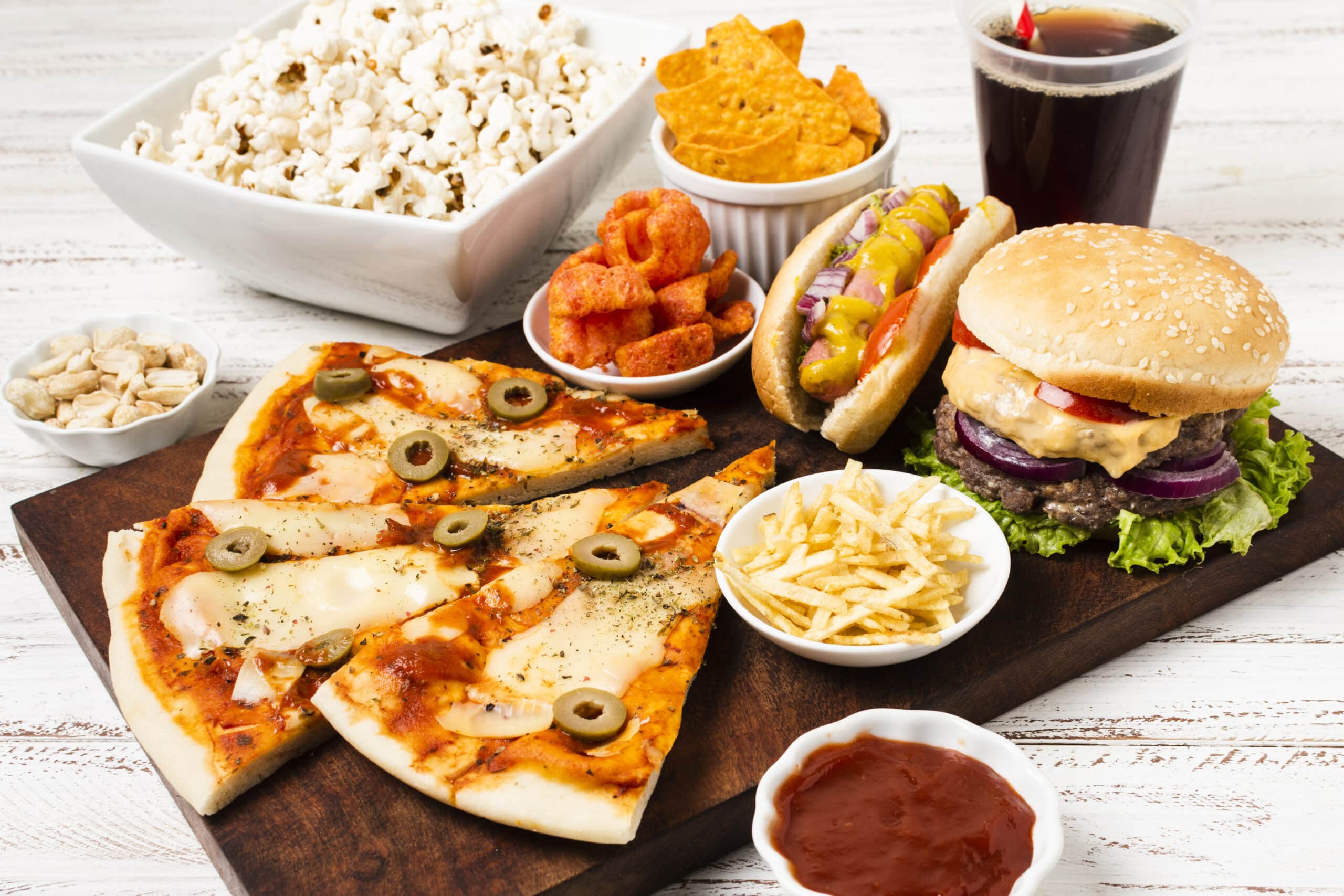The Connection Between Cannabis & Appetite
by Haley Mills · March 1, 2023
Learn about the link between cannabis and appetite, including how it can increase appetite and why it may be beneficial for some people.

Have you ever smoked weed and realized you were intensely hungry about thirty minutes later? If you’ve experienced cravings for salty or sweet junk food and wondered what’s up with the snack attack, this article is for you. Here, we’ll cover how our bodies know when to eat, why cannabis can bring on the munchies, and how MMJ may help patients looking to gain or maintain a healthy weight.
How do normal hunger signals work in the body?
Hunger pangs are felt in the gut but controlled by the brain. Appetite control begins in the hypothalamus, which regulates the chemical signals that activate your senses. Even thinking about food activates the neurotransmitters in your brain associated with hunger. Two sets of neurons in the hypothalamus either promote or suppress appetite.
Hormones are released when food breaks down during digestion. Ghrelin and leptin are hormones circulating and communicating through the blood, generating and suppressing hypothalamus neurons. You’ll feel hungry when ghrelin levels are high, and when leptin levels are high, you feel full and stop eating.
Where did the term “munchies” originate from?
The term munchies come from Charles Tart’s 1971 study, “On Being Stoned,” where researchers observed marijuana users and their cravings for sweets. Urban Dictionary describes the munchies as “the compelling and intense feeling of hunger after smoking weed.” While accurate, there is an even more scientific explanation as to how weed can increase appetite.
How does cannabis affect our hunger signals?
THC is the psychoactive compound in cannabis that makes you high and can affect your body in many ways. Ginger Hultin, RD, is the spokesperson for the Academy of Nutrition and Dietetics and the owner of Champagne Nutrition.
She states that munchies happen when THC stimulates your body’s endocannabinoid system in the brain to promote an urge to eat. She goes on to say that there is evidence that weed encourages the production of a hunger hormone called ghrelin.
The endocannabinoid system comprises an extensive network of chemical signals and cellular receptors densely packed throughout our brains and bodies. The “cannabinoid” receptors in the brain — the CB1 receptors — outnumber many other receptor types in the brain.
They act like traffic cops to control the levels and activity of most of the other neurotransmitters. They regulate things by immediate feedback, turning up or down the movement of whichever system needs to be adjusted, whether hunger, temperature, or alertness.
Our bodies produce endocannabinoids to stimulate these receptors, which are similar to molecules in the cannabis plant. The endocannabinoid system regulates learning and memory, emotional processing, sleep, temperature control, pain control, inflammatory and immune responses, and eating. This vital system is currently at the center of renewed international research and drug development.
IMPROVED APPETITE AND NAUSEA REDUCTION
Professional medical advice suggests that cannabinoids have varying health benefits. They have been used throughout history to manage various health concerns and ailments. While research continues, more evidence suggests that cannabis and cannabinoids can benefit human health. Different cannabinoids are also being looked at as options that may benefit those who suffer from autoimmune diseases such as rheumatoid arthritis, lupus, Crohn’s disease, multiple sclerosis, and HIV/AIDS.
Two FDA-approved cannabis-related medications with medical benefits are nabilone (Cesamet) and dronabinol (Marinol). They are synthetic cannabinoids, not made from the cannabis plant, and are prescribed for nausea, vomiting, and low appetite.
Recommended Foods for a Snack Attack
If you are aware that the cannabis strain or products that you are using may cause the munchies, it’s best to be prepared with some healthy snacks to combat those cravings. We recommend hummus and veggies, cheese and crackers, mixed nuts, popcorn, trail mix, fruit, cereal, or chocolate pudding as semi-healthier options to chips and cookies. Once you have gotten the hang of your cannabis routine, it may be easier to recognize a snack attack and fight it off with a healthy option when prepared.
FAQs
Why does weed make you hungry?
The munchies happen when THC stimulates your body’s endocannabinoid system in the brain to promote an urge to eat. There is also evidence that cannabis use encourages the production of a hunger hormone called ghrelin.
Will using cannabis often make you gain weight?
As long as your snack choices don’t get out of control while using cannabis, it can actually help you maintain a healthier weight or even lose weight in some cases. Scientific evidence has demonstrated that smoking cannabis may increase metabolism, which can help you burn more calories, resulting in a reduced body mass index (BMI).
The potential pain and stress-relieving properties of medical marijuana may aid in losing weight. You’re much more likely to exercise and maintain a lifestyle when you aren’t feeling intense pain every day.
Stress strongly correlates with weight gain and increased cortisol levels and can be significantly decreased by using certain cannabinoid products. In turn, people who are less stressed and anxious get better sleep and are less likely to suffer from obesity. Cannabidiol CBD, primarily, has been known to help with insomnia. There are many ways smoking weed can help with weight loss, although many benefits may be indirect.
However, for cancer patients and those needing a strain that stimulates hunger and promotes food intake, there are pure Indica’s that can help enhance eating pleasure and thus gain weight to get healthier. It’s important to remember everything is case by case.
Are there weed types that suppress appetite?
Yes. Cannabis users tend to report that Sativa-dominant strains suppress hunger and “munchies” onset more than Indica strains due to the higher volume of THCV present in Sativa plants. Indica tends to work more as an appetite stimulant.
If you are worried about weight gain with weed, we recommend sticking with a pure or Sativa-dominant hybrid. The terpenes limonene and humulene may also help decrease appetite stimulation.
Does food taste better high?
Possibly. Research shows that THC stimulates the endocannabinoid system and cannabinoid receptors in our brain that regulate emotion, pain, smell, and taste.
Last Updated: August 8, 2024
Get Approved for Your Medical Marijuana Card in Minutes!

Get Your Medical Card
Connect with a licensed physician online in minutes

Like This Article?
Share with your friends
Table of Contents
Keep Reading
-
Navigate Ohio Marijuana Card Renewal: A Step-by-Step Guide
Simplify your ohio marijuana card renewal with this step-by-step guide to stay compliant.
-
Which States Allow Home Growing Cannabis?
Unlock the Secrets: Discover Which States Allow Home Growing Cannabis. Find Out Where You Can Legally Grow Your Own Weed and Start Cultivating Today!
-
Is Cannabis Considered A Depressant?
Find out the truth about cannabis as a depressant and its impact on your mental health. Click now to uncover the surprising facts and gain valuable insights!



